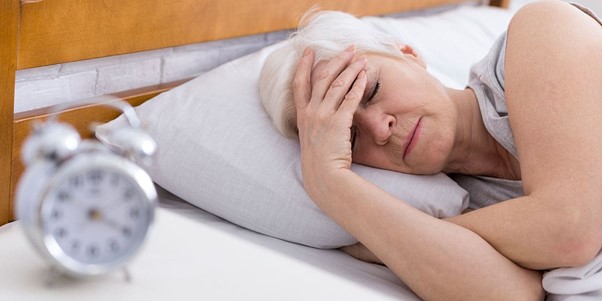How Does Menopause Affect Sleep Quality and What Can You Do About It?
- Susan King

- Jun 24, 2025
- 4 min read
Sleep is essential for good health. However, many women in perimenopause and menopause face challenges such as insomnia and disrupted sleep patterns. As the body undergoes significant changes during this period, it’s crucial to understand how these changes impact sleep quality and to explore effective strategies to improve it.
The Importance of a Good Night’s Rest
Quality sleep is vital for both physical health and emotional well-being. It supports cognitive functions, regulates mood, and aids in recovery. Research shows that quality sleep enhances memory, reduces the risk of chronic diseases, and promotes longevity. In fact, studies indicate that women experiencing menopause report sleep issues affecting nearly 75% of their overall well-being. Compromised sleep can worsen other menopausal symptoms, resulting in a cycle of discomfort.
Good sleep helps maintain energy levels and emotional balance. However, many women find that during menopause, getting a restful night becomes challenging.
How Hormones Influence Sleep
Fluctuations in estrogen and progesterone greatly affect women's sleep patterns. For example, estrogen helps maintain stable sleep cycles, while progesterone promotes relaxation and restorative sleep.
As women approach menopause, decreasing hormone levels can lead to various sleep disturbances. One study found that 57% of women reported insomnia linked to hormonal changes during this time. Understanding this hormonal effect is crucial for addressing sleep issues.
Factors Affecting Sleep Beyond Hormones
While hormonal changes significantly disrupt sleep, other factors such as lifestyle, stress, and dietary habits also play a role.
Environmental factors such as noise, light, and temperature can hinder sleep, even for women not experiencing hormonal changes. A recent survey revealed that about 60% of women reported environmental disturbances affecting their ability to sleep soundly.
Why Do We Suffer from Insomnia During Perimenopause and Menopause?
Several factors contribute to insomnia during perimenopause and menopause:
Hormonal Fluctuations
The decline in estrogen and progesterone directly impacts sleep regulation. This shift disrupts the natural sleep cycle, leading to trouble falling asleep and maintaining restful sleep.
Night Sweats and Hot Flashes
Many women suffer from night sweats and hot flashes, which can cause frequent awakenings. According to studies, about 75% of menopausal women experience these symptoms, interrupting deep sleep and making it hard to fall back asleep.
Increased Stress and Anxiety
Hormonal changes can increase stress and anxiety levels. This heightened state of alertness often results in racing thoughts, making it difficult to relax before sleep. Research suggests that mood disorders affect nearly 40% of menopausal women, further complicating sleep.
Bladder Sensitivity
Lower estrogen levels can increase bladder sensitivity, leading to frequent nighttime urination. This forces women to wake multiple times during the night, disrupting sleep. Studies indicate that around 40% of women experience these disturbances during menopause.
Restless Leg Syndrome (RLS)
Restless Leg Syndrome (RLS), characterized by uncomfortable sensations in the legs, affects some women during menopause. This urge to move can substantially hinder the ability to fall or stay asleep.
Gut Health and Nutrient Deficiencies
Poor gut health can negatively impact sleep quality due to decreased nutrient absorption. Essential nutrients such as magnesium, iron, and B vitamins are crucial for producing neurotransmitters and melatonin, both vital for regulating sleep.
Iron Deficiency
Low iron levels can lead to fatigue and hinder oxygen circulation, worsening symptoms of RLS. Ensuring adequate iron intake through dietary sources like lean meats, beans, and leafy greens can significantly improve sleep quality.
Strategies to Improve Sleep
Improving sleep during menopause requires proactive steps. Implementing various strategies can help women regain control over their sleep quality.
Create a Sleep-friendly Environment
Creating a comfortable sleeping environment is fundamental. Keep your bedroom cool, dark, and quiet. Use blackout curtains, white noise machines, or air purifiers to create an optimal space for rest.
Establish a Consistent Sleep Routine
Maintain a consistent sleep schedule by going to bed and waking up at the same time every day. Developing a calming pre-sleep routine, such as reading or meditating, can signal your body that it's time to unwind.
Monitor Diet and Nutrition
Be mindful of your diet, as it significantly impacts sleep quality. Include sleep-friendly foods rich in magnesium, zinc, and calcium, such as nuts, seeds, and dairy. Avoid heavy meals, caffeine, and alcohol close to bedtime to enhance sleep quality.
Incorporate Relaxation Techniques
Engaging in techniques such as deep breathing, yoga, or mindfulness meditation can lower stress levels and prepare your body for restful sleep. These practices help ease the racing thoughts that often accompany insomnia during menopause.
Consult Health Professionals
If sleep problems persist, consider reaching out to healthcare professionals. They can provide insights, prescribe treatments, or recommend therapies tailored to your specific needs.
Eye-level view of a calm bedroom setting with soothing colors
Taking Charge of Your Sleep Quality
The transition through menopause can significantly challenge sleep quality. Hormonal fluctuations, night sweats, increased anxiety, and various other factors can all contribute to insomnia and disrupted sleep patterns. However, by understanding these influences and implementing effective strategies, women can take proactive steps to reclaim restful sleep.
Prioritizing sleep during this transition can lead to improved physical health and emotional stability. With commitment and the right approaches, better sleep is achievable at any stage of life.

keep smiling
Sue












Comments